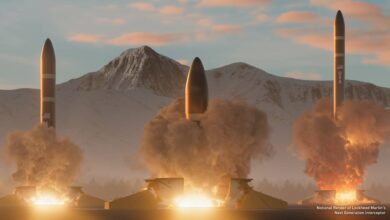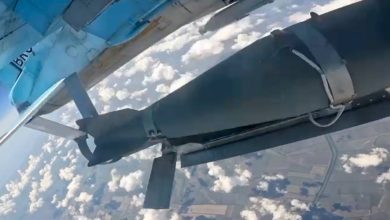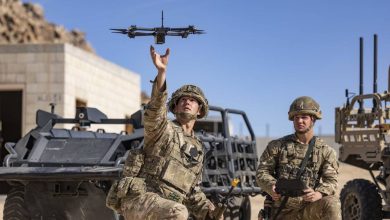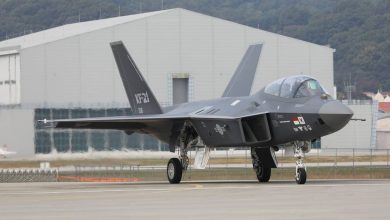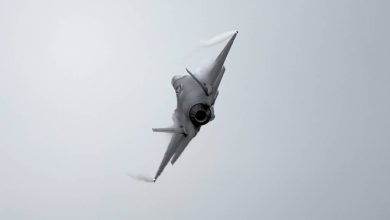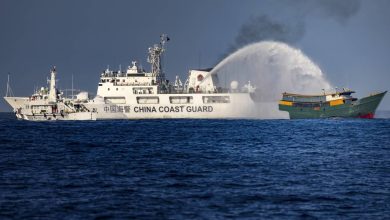White House redirects air defense interceptors to embattled Ukraine
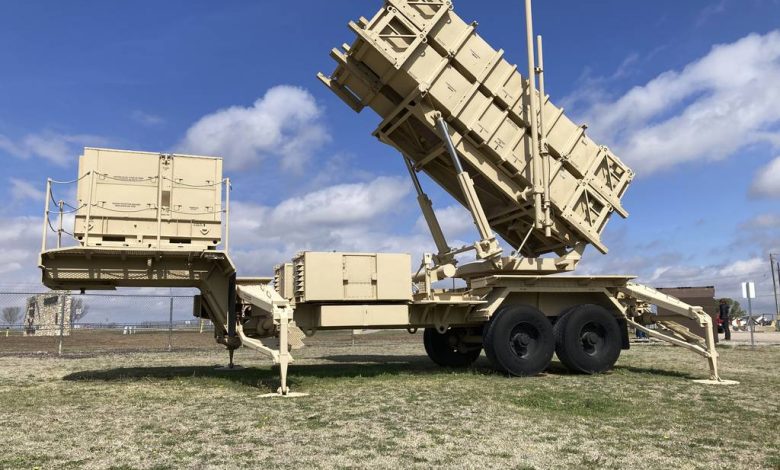
The U.S. moved Ukraine to the front of the line for its sales of air defense interceptors — one of the most critical weapons in Ukraine’s self-defense.
National Security Council spokesman John Kirby announced the reshuffle in a briefing today, calling it “difficult but necessary.” In the short-term, he said, Patriot and NASAM interceptors that had been slated for other countries will now go to Ukraine.
“As a result, deliveries for these missiles to other countries that are currently in the queue will have to be delayed,” Kirby said.
The White House expects Ukraine will receive these air defense weapons by the end of the summer. Kirby said the number will be in the hundreds, and that the decision should give Ukraine what it needs for the next 16 months. At that point, the countries who currently have air defense missiles on order can expect to start seeing theirs delivered.
“To be clear, those countries will still receive the missiles they have ordered,” Kirby said. “It’s just that the delivery will take a little longer.”
He did not say which countries would be affected by the delays, but noted that the decision will not impact Taiwan or Israel.
Lockheed Martin is fully funded by the U.S. Army to build 550 PAC-3 Missile Segment Enhancement (MSE) missiles a year at its Camden, Arkansas, production line and hit a rate of 500 per year in December 2023.
While the Army has yet to fund another missile production increase, Lockheed has invested internally to build 650 interceptors a year.
In 2023, Lockheed signed six letters of approval with international customers.
There are 19 countries with the Raytheon-made Patriot and that customer base is growing. Switzerland purchased five batteries and 75 missiles in November 2022 and Romania plans to buy additional fire units. At least two other European countries are close to announcing plans to buy Patriot, according to Raytheon this spring.
Slovakia has recently expressed interest in purchasing Patriot, and Germany has said it intends to grow its Patriot force.
The decision is one of the most extraordinary measures America has taken to protect Ukraine since the full-scale war with Russia began two years ago. For months, Pentagon leaders have said that air defense is at the top of the agenda for the countries supporting Kyiv. And they’ve taken recent steps to prove it.
“Air defense has been at the top of my agenda for a long time,” said U.S. Secretary of Defense Lloyd Austin at a June press conference.
Austin spoke at NATO headquarters in Brussels, shortly after a meeting of countries that gather each month to coordinate support for Ukraine. Just before the summit, multiple outlets reported that the U.S. was sending another Patriot system to Ukraine — though neither Austin nor Chairman of the Joint Chiefs of Staff Gen. CQ Brown would confirm the news.
Ukrainian President Volodomyr Zelenskyy said in June his country needs seven Patriot systems, one of the most advanced air defense systems in the world. Germany announced earlier this year that it would send one to Ukraine. The Netherlands similarly committed to assembling and sending another system.
Other countries have committed different air defense systems altogether, such as NASAMS.
“It’s not just Patriots,” Austin said at the June presser, listing out other systems. “It’s a number of capabilities that Ukraine needs, and they need the interceptors to complement the platforms.”
Short supply
Despite their importance, both air defense batteries and the interceptors they fire are in short supply. The U.S. and its allies have spent much of the war sourcing whatever extra weapons are available — especially as Ukraine faced drone and missile barrages on its cities and critical infrastructure. The decision this week reflects how tight the supply chain for these systems is. Rather than expanding capacity, the U.S. has reordered it.
“It’s a reminder of the importance of expanding inventory,” said Tom Karako, an expert on air defense at the Center for Strategic and International Studies, of the decision.
Karako said that the money meant to expand that capacity included in the April national security supplemental — a massive refresh of security aid to Ukraine and other countries — hasn’t been spent yet. Though there is around $48 billion for military aid to Ukraine in the package, the amount marked for air defense isn’t specified, he said.
“You don’t just turn on a dime and start spitting out Patriots like a Xerox machine,” Karako said.
The White House didn’t specify what countries will be affected by the reshuffle, though Karako said that the likely candidates will be in Europe and the Middle East.
Kirby said that Washington would do what it could to shorten any delays.
Still, he said, “each country is going to have a different set of circumstances that apply to that based on what they’ve ordered and what their own self-defense needs are.”
Noah Robertson is the Pentagon reporter at Defense News. He previously covered national security for the Christian Science Monitor. He holds a bachelor’s degree in English and government from the College of William & Mary in his hometown of Williamsburg, Virginia.
Bryant Harris is the Congress reporter for Defense News. He has covered U.S. foreign policy, national security, international affairs and politics in Washington since 2014. He has also written for Foreign Policy, Al-Monitor, Al Jazeera English and IPS News.
Jen Judson is an award-winning journalist covering land warfare for Defense News. She has also worked for Politico and Inside Defense. She holds a Master of Science degree in journalism from Boston University and a Bachelor of Arts degree from Kenyon College.
Read the full article here

